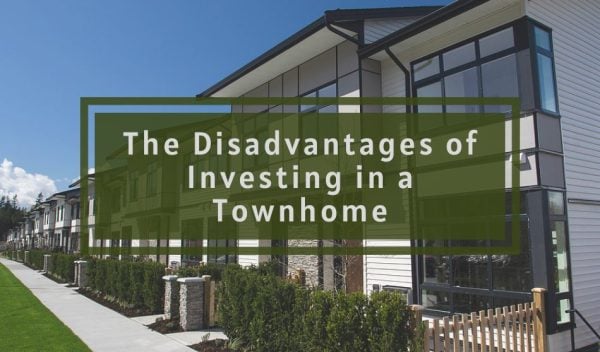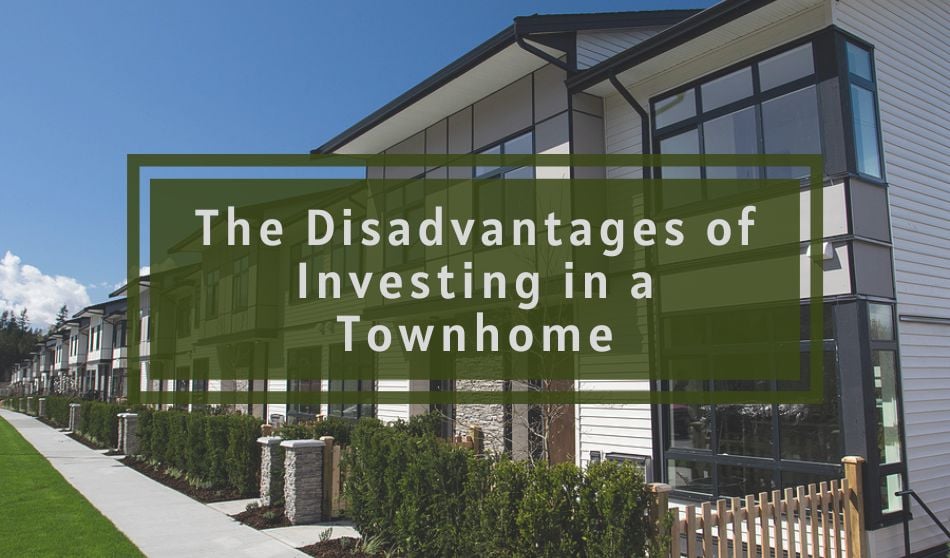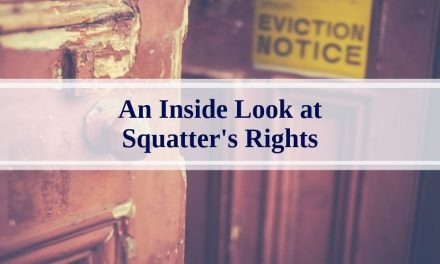
Buying a townhome can seem like an appealing first step in property ownership. They typically cost less money than a single-family home, making them more affordable on the surface to first-time homeowners or new real estate investors.
However, townhomes can come with hidden costs and inconveniences that may not present themselves until after purchase. These may not be problems for all buyers, but it’s important to know what you’re getting into before you make an offer.
Here’s a look at some of the disadvantages of investing in a townhome to take into consideration before you buy.
Homeowners Associations (HOAs)
Many townhomes require all owners to be part of a Homeowners Association (HOA). In exchange for a monthly fee, residents have access to benefits such as lawn care, snow removal, swimming pools, a clubhouse, and more.
While these may sound like great benefits, they usually come with a high price tag that you’ll have to pay monthly or annually. Whether you’re buying them to live in or to rent out, you’ll want to factor that regular cost into your budget knowing the price will likely increase over time. If you’re planning to rent out the property, those high fees will cut your profit.
HOAs also come with a lot of rules. Most of these rules apply to upkeep and appearance. On the plus side, this ensures that units are well-maintained, helping all of the properties to maintain their value. On the downside, some HOAs are so strict that you will have limited ability to choose paint colors or finishes, making it hard to put a personal touch on the property.
If you’re buying real estate with the intent to have a rental property, you should take a close look at the fine print in the HOA agreement. Some HOAs do not allow units to be rented out, either to long-term tenants or vacationers. So make sure you can go forward with your rental property plans free from limitations before buying.
Slow Appreciation in Value
The low purchasing price for townhomes is what may initially attract a potential investor. Investors looking to buy an inexpensive property in hopes of selling it for a higher price later – known as wholesale real estate investing — may want to wait a longer period so they can earn a decent return on their investment.
Like most real estate properties, the value of a townhome will increase over time. However, compared to single-family homes, such as detached properties and condos, they increase in value at a slower rate. That makes townhomes a better option for investors looking to rent the property compared to wholesale or fixer-upper investors.
Another point to keep in mind: townhomes typically have smaller square footage compared to detached properties. So while a townhome may sound like a cheaper purchase, the cost per square footage may be higher than a comparable property, making it less of a bargain buy.
Proximity to Neighbors and Communal Spaces
Like condos and apartments, townhomes require residents to be in close quarters with their neighbors. This setup can create a lot of conflict for owners and renters alike.
Before buying, take note of how many shared walls the property has. Once you do, find out how well insulated the walls are by testing whether neighbors moving, talking, or yelling can be heard. Noise complaints and privacy are among the biggest sources of conflict for residences with shared walls.
You should also find out how much privacy is available on the townhome’s lot. While some townhomes may allow owners to put up privacy fences, most HOAs require all townhome properties to keep their outside spaces consistent, which may mean little to no privacy between neighbors in front and backyards.
Speaking of the HOAs, while you may be paying for access to amenities, such as pools and fitness centers, it’s important to note that these are shared amenities. You may find yourself or your tenants struggling to access any of these amenities if there are a lot of people living in the community.
If you or your prospective tenant end up in conflict with one of the neighbors, you could find yourself with a big headache. While most corporate owner apartments and condos have staff available to resolve issues, the burden of conflict resolution will fall on you as the owner.
Limited Accessibility
Townhomes may also cause accessibility issues for people with limited mobility. Most townhomes are narrow in build, with living spaces on multiple floors to accommodate the small lot size. Because of this, most living spaces are accessible only by a staircase, which can be a serious problem for people with limited mobility.
Townhomes can pose other issues for people with limited mobility beyond staircases. For example, the smaller size might make it difficult to install showers or bathtubs that are more accessible.
While this may not be an issue for all homeowners, it could make it more difficult to rent out. Cities and states have different accessibility requirements for properties that take tenants. If you are curious about regulations in your community, it might be time to check in with a top-rated real estate expert who can answer your questions and give you peace of mind.
Lower Income potential
Not only do townhomes increase in value at a lower rate than detached homes and condos, but townhomes often come with a lower earning potential as rental properties.
Because of the issues already raised — proximity to neighbors, size constraints, and limited accessibility – townhomes are harder to rent than other residences. To be competitive in the market and to secure tenants you will likely have to charge a lower monthly rent than similarly sized condos or detached homes.
Before committing to a townhome as a rental property, do thorough market research of rental prices in your community. The lower upfront cost of buying a townhome may not turn out to be beneficial if the income potential is substantially lower than another property with a higher purchase price.






